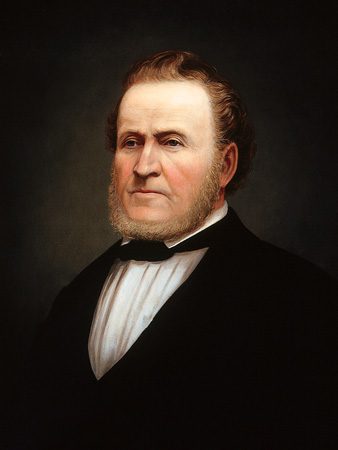By Richard H. Cracroft
Latter-day Saints soon learn why we are called “the people of the book.” Mormons who will rise to Latter-day Sainthood center in the Holy Scriptures, the word of God, which convey to everyone (earth- or heaven-side) the Godspell (Old English), that “Good News” about the plan of redemption and the Word Made Flesh. That Godspell shouts from the Holy Books in banner headlines that the Father and the Son, from Infinity, know, hear, speak to, teach, and counsel their mortal children about the strait and hard, but negotiable, way to redemption, the way back home.
The Latter-day Saints, having undergone what Alma the Younger called “the mighty change,” and having seen to it that their own families are “born again,” or are at least in promising gestation, look to the urgent task of sharing the Godspell with their mortal brothers and sisters who have momentarily lost their bearings and forgotten their eternal parentage. These fellow wanderers have need, now, during their second estate, to find their purpose in mortality, to learn the way home as it is charted for them in the Holy Scriptures, those testifiers of the plan of redemption from a host of gospel dispensations, including the present one.
Given this inevitable destiny, it is no coincidence that much of the literature which the Saints read, study, take to heart, write, refer to, live by, and teach will center in or arise from explorations of the Good News from the Holy Scriptures and the meaning and implications of that Good News for a believing people living amid an unseeing, deaf, and unbelieving people. Studying, pondering, commenting on, and writing about the word of God becomes our meat and drink and mortal joy and urges us to our task, which is not only to live in harmony with the restored Godspell, but also to fulfill our covenanted and inevitable destiny as sons and daughters of Abraham by singing the song of redeeming love, the Good News, in the ear of every child of God‹and thus establish Zion. So we read, ponder, write, and make books about this most important news which mortals can receive: the Godspell of the Son of God, the Redeemer of every soul‹it is part of what makes us “a peculiar people.” Any other news is secondary and ephemeral.
BYU alumni and faculty continue to be variously and “anxiously engaged” in explaining the Good News to the members of the Church as well as to those who may be curious about the Good News restored and enlarged. Consider a small handful of many outstanding recent works which help us to understand more fully the meaning of that Good News. Such is Marilyn Arnold’s Good News about the Book of Mormon in Sweet Is the Word: Reflections on the Book of Mormon‹Its Narrative, Teachings, and People (Covenant, 1996). This book-length commentary is indeed Good News for those who love the Book of Mormon and wish to entwine it with their souls. Besides being a noted athlete, Dr. Arnold is a BYU professor emeritus of English, former assistant to the president, dean emeritus of the graduate school, founding director of the Center for the Study of Christian Values in Literature, and nationally renowned Willa Cather scholar (four books and many articles). In Sweet Is the Word, however, Sister Arnold sets all of that aside to offer a rich and moving personal essay on the Book of Mormon, a study and commentary which conveys her “personal response to the book” (vii). That response reflects the soul (D&C;88:15) of a spiritual, Christ-centered woman who brings to her essay not only a well-trained literary mind and rich imagination, but also a seasoned life of devotion to her faith as well as an exceptional ability to write her faith tellingly so as to nudge readers to their own personal discoveries and responses. With Sweet Is the Word in one hand and the Book of Mormon in the other, the reader becomes acquainted, as perhaps never before, with the individuals of the book, with the clear differences among the dramatis personae, as men and women spring to life under Arnold’s touch. Indelibly interwoven through the text are the testimonials of Arnold’s own spiritual rebirth and “mighty change,” which she obviously experienced while writing the book. That spirit works on the reader, who follows as Arnold brings to the Book of Mormon her faith and her training in textual analysis to find herself at once startled and deeply touched by her re-discovery of “the essence of Mormonism” in “the sweet word, the sweetest of words.”
I also experienced Godspell in the spiritual richness of S. Michael Wilcox’s House of Glory: Finding Personal Meaning in the Temple (Deseret Book, 1995). Here, at last, is a book written not for novices but for seasoned temple-worshipers, a book which suggests thoughts and insights which help temple-going Latter-day Saints to follow President Howard W. Hunter’s charge to “establish the temple of the Lord as the great symbol of their membership.” Wilcox helps us to transcend the routines of temple work by uncovering in those ceremonies and sacred precincts spiritual and symbolic levels which afford personal enrichment, new insight, and fresh meaning. In six well-written essays, Wilcox explores the temple as a symbol of our membership, a house of learning, a house of refuge, a house of order, a house of glory, and a house of thanksgiving. An LDS institute of religion instructor at the University of Utah, Wilcox illustrates his points with some well-told and applied stories from contemporary life, history, and the scriptures, all intended to open veteran temple-goers to some Good News about breaking free to new spiritual levels through temple worship.
A third but very different Godspell-bringer for Latter-day Saints is Working Toward Zion: Principles of the United Order for the Modern World (Aspen Books, 1996), by James W. Lucas and Warner P. Woodworth. This work brings Good News to Saints who, amid the prevailing but troubled economic arenas of capitalism and socialism, desire to respond to modern prophets who urge the Saints to abandon the “economics of competition and inequality” in favor of Zion’s economic principles. Lucas and Woodworth, while not sounding a trumpet for full-scale economic revolution or the establishment of formal united orders, point out how Latter-day Saints can foster the spirit of Zion through private group initiatives. The authors suggest how such gospel-centered employee ownership and business cooperatives in third-world and emerging countries, and even on the east bench of Salt Lake City, could free the Saints from worldly economic burdens and fears and enable a harvest of spiritual and material blessings. In Working Toward Zion, as Dr. Hugh W. Nibley attests in his foreword, Lucas and Woodworth “convey a vision of how to apply God’s temporal teachings here and now in the modern world economy.”
The Godspell applied in daily living is also the Good News of a good life: Mary Lythgoe Bradford’s well-crafted Lowell L. Bennion, Teacher, Counselor, Humanitarian (Dialogue Foundation, 1995) recounts with deserved admiration the life of “Brother B.,” a remarkable man of God, beloved LDS institute teacher, and hands-on Christian. At his recent death, “St. Lowell,” as some called Bennion, left a legacy of applied Mormon Godspell which touched thousands through his teaching, writings, and fireside addresses (he is credited with establishing the LDS fireside tradition) and, above all, through his countless deeds of personal and organized charity which humanized abstract theology.
If Brother Bennion sings the Godspell applied, then Eugene England, in his latest book, Making Peace: Personal Essays (Signature, 1995), preaches the Godspell implied. Born-again agonizer over earth/heaven incongruities, England questions, in 11 thoughtful yet discomfiting essays, the truth and implications of numerous and too-seldom-questioned Mormon traditional and popular views about how we interpret and apply the spiritual ideals of the restored Godspell to the complex challenges of mortality. His Mormon/ humanist essays on difficult issues range from the controversy over the perfection versus progression of God and the spiritual dissonance and bigotry caused by self-righteous politics to the moral dilemmas which arise when God asks humans to violate moral principles He has taught them to uphold (Abraham and Isaac, Nephi and Laban, followers of the Prince of Peace condoning war and supporting capital punishment). England, who makes thoughtful waves amid calm complacency, is a deep-diver who asks hard, important questions and delves, in faith and good will, behind the easy answer and beyond the superficial explanation to pose scripture-based but human-centered answers which will be Good (though sobering) News to those plodding toward true discipleship.









